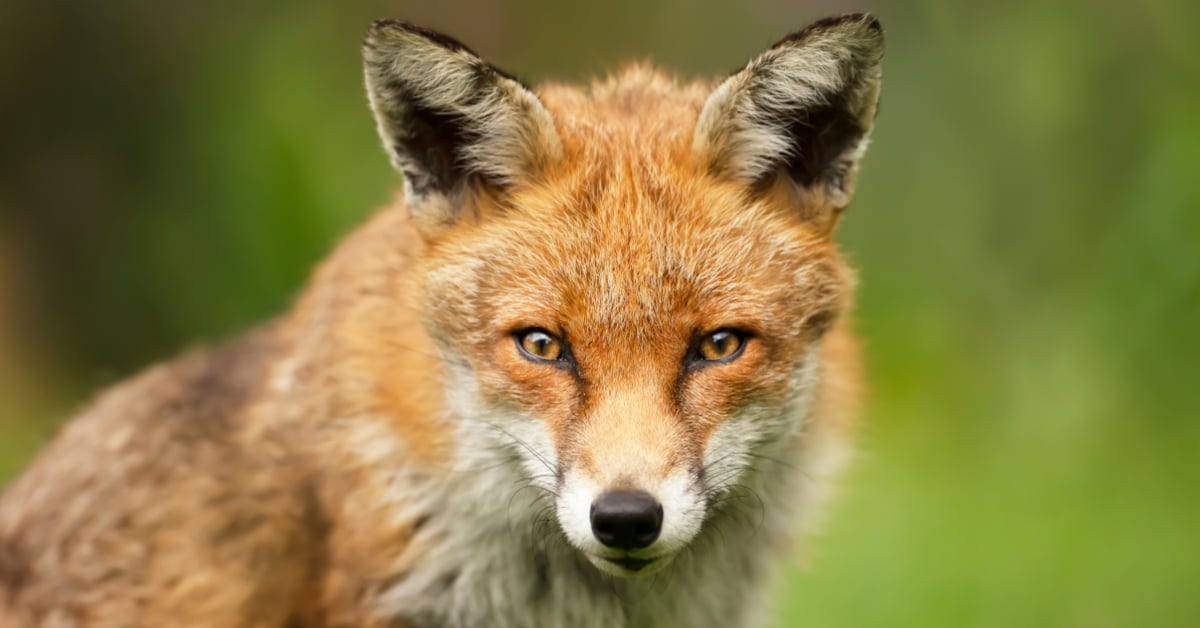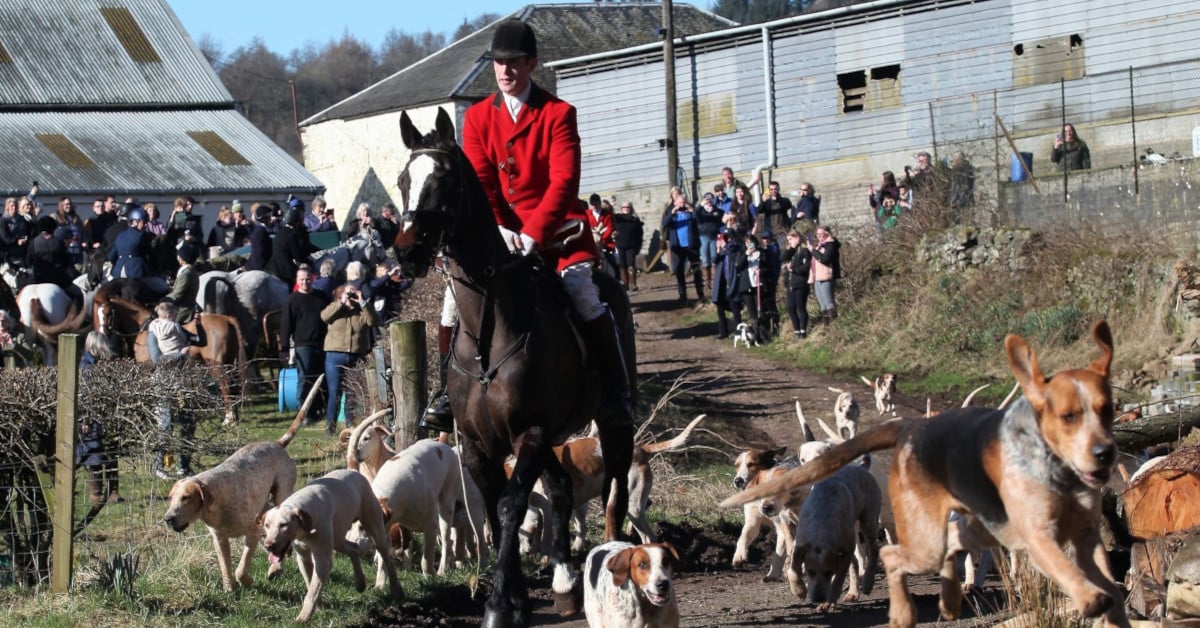Two recent incidents point to a yawning void in the world of hunting. First, fintech company SumUp put hunting on its shit list, meaning hunts can no longer use it as a transaction method. Second, the British Hound Sports Association (BHSA) published a video pleading for new members. Together, they expose the hunting industry’s financial vulnerability.
When SumUp pulled its support for hunting, it allegedly did so in the middle of some hunts’ fundraising – literally. According to the Telegraph, which first reported on the news, SumUp’s new policy went into effect during a point-to-point fundraiser for the Oakley Hunt in March. It is the result of the card payment processor adding “Hunting clubs/activities” to its list of restricted businesses. Cue overblown handwringing by Countryside Alliance hunting hype person Polly Portwin, who claimed the move was “disgraceful” and somehow discriminatory against “rural communities”.
Just a few days before the Telegraph published its report, the BHSA put out a new video. Filmed at the recent Festival of Hunting, it features a rogues’ gallery of hunt masters and staff asking viewers to sign up as members. Crucially, the video said the BHSA needed money to continue its campaigning not in ten years but in ten weeks. It hung an impending general election overhead at the start of the video as a threat. The BHSA is, of course, the replacement for the disgraced Hunting Office and has been responsible for industry-wide PR since the previous body collapsed following the conviction of Mark Hankinson.
Placed side-by-side, these two incidents expose a sometimes hidden truth about hunting. For all its attempts to naturalise itself as a rural ‘tradition’ or ‘community pastime’ – see Portwin’s comments above – hunting is ultimately an industry constantly wrestling with the problems of finance. And that problem for them is an advantage for us.
Hunting ain’t cheap
It’s not cheap to run a hunt. Extensive financial records for numerous hunts published by Hunting Leaks shone a light on some of the costs that go into it. Documents showed, for example, that the Taunton Vale Harriers’ projected outgoings for the 2021/22 season ran more than £40,000. And that’s a comparatively small hunt. The much larger Heythrop Hunt, meanwhile, recorded its year-to-September 2021 outgoings as £177,728. These are small business figures.
As a result, hunts face the same concerns as other small business owners. First and foremost of those is financial precarity. Hunting Leaks’ write-up of the Taunton Vale Harriers’ financial woes, for example, illustrates this point perfectly. Even best-case projected income for that year resulted in only a £8,550 profit margin, leaving little room for unexpected mishaps. And that is a hunt that doesn’t get sabbed or monitored regularly. Figures are healthier for the Heythrop Hunt, whose much larger income meant it finished the year with more than £100,000 in the bank. But most hunts across England and Wales are more similar in size to Taunton Vale Harriers than the Heythrop Hunt.
Smashing an opponent’s finances is a basic strategy for struggles and conflicts of all sizes, and it’s no different in the fight against hunting.

Money, money, money
When SumUp switched off the Oakley Hunt’s card machines, it was during a point-to-point event. These are local horse racing events that, in the UK, are run largely in conjunction with nearby hunts. These events are big earners for the relevant pack. According to documents released by Hunting Leaks, for example, the Mendip Farmers Hunt made more than £10,000 from its 2019/20 season point-to-points. Its total income that year was £83,939. During the same season, point-to-points brought the Cottesmore Hunt £10,000 of its £230,000 total. Often, the income from these events is second in amount only to subscriptions/caps.
The SumUp incident must have come not only as a shock but as a blow to the Oakley Hunt, then. Countryside Alliance head Tim Bonner said it resulted in “delays getting in or buying a round in the beer tent”, though quite how much money it lost the hunt is unknown. But the backlash to SumUp’s decision clearly touched a nerve with the hunting industry, whose ongoing arrogance leads to cries of victimisation at every new blow to its crumbling empire.
Meanwhile, the BHSA’s call for new members in order to fund campaigning suggests that times are increasingly hard not just for individual hunts but for the industry as a whole. As recently as October 2021, the Countryside Alliance claimed it had 50,000 paying members and more than 100,000 supporters. Given that the BHSA says it needs just 10,000 people, one wonders why the association couldn’t appeal to a fraction of these Countryside Alliance supporters that don’t give the organisation a penny. The fact it even needs to be fundraising within its first 18 months is telling of the state the industry is in.
Hunting and its holy crusaders enjoy demeaning sab group efforts at fundraising as ‘putting out a begging bowl’, in an accusation that betrays their classist attitudes. Yet here we are. Not only are hunts so touchy about their finances that a private company choosing not to do business with them results in accusations of ‘prejudice’ and ‘discrimination’, but their top body is pleading for new members to fund an election campaign.
Who’s got the so-called ‘begging bowl’ out now?
Stemming the flow of cash
While sabs and monitors continue disrupting hunting on a week-to-week basis, the campaign to disrupt hunting’s financial lifeline is something that any of us can take on. Some sab groups organise protests and demos outside so-called pleasure rides, which are fundraising events where hunts invite people to ride along with the hunt – either with or without hounds. The idea here is to make attendees feel uncomfortable about attending, potentially alienating them from future hunt events. These demos are often open to the public and greater numbers makes a greater point.
In February, Protect the Wild wrote about INEOS Automotive’s financial support for hunting through its partnership with the Point-to-Point Authority. When we contacted the car company at the time about the event’s associations with hunting, it said:
“We have seen no evidence that suggests our dedication to supporting those who work and live in the countryside has helped fund illegal fox hunting in any way, but we are looking into the matter.”
However, wider society is rapidly turning against the smokescreen that the hunting industry has thrown up. Quite how long INEOS Automotive can continue holding its above position remains to be seen. You might want to ask them yourself from their contact page – but keep it polite, of course. You could also join or encourage local animal rights groups to protest against point-to-points, as horse racing is a serious animal rights/liberation issue as well.
Things can and are changing quickly. When AXA was revealed as underwriting the Hunting Office’s insurance, for example, one of the policy’s stipulations was that there was no cover for legal cases if suspects pleaded guilty. However, after Hunting Leaks revealed AXA as the underwriter, it quickly abandoned hunting in early 2022. Since then, it appears no other company has taken up the poison chalice. It’s likely no coincidence that, where before 2022 there were no guilty pleas for Hunting Act offences, there has since been at least six.
This type of sudden turnaround is what can finish an industry off. And finances are no different to that.

Organised crime
Bonner, in his screed on the SumUp incident, blamed “PR consultants” for the company’s move. Yet its clear that this is part of wider public understanding that, nearly 20 years after the Hunting Act came into force, hunts across England and Wales are still out chasing and killing wildlife throughout the year.
Perhaps most significant on this front is a change in attitude by police forces, something that Wild Mammal Persecution UK first appeared to report in February 2022. This has led to some actual policing of people involved with hunting, including co-ordinated raids on terriermen and using mobile phones as evidence. It appears that many police officers and forces – including the national lead on hunting Matt Longman – are now willing to admit that hunting is institutionally rotten. This seems much more likely for SumUp’s move than Bonner’s claim. And in a turning point reminiscent of AXA’s decision, it could potentially lead to more financial institutions following in its lead and further ramifications.
Maybe Bonner is naive? Maybe he’s trying to put on a brave face? Or maybe he’s in denial? Whatever the reason, the net is clearly closing and things are changing quickly. Hunting is an industry, and while we wait for new and effective laws, we can all do our part to make hunts financially inoperable.
Sign Protect the Wild’s petition for a proper ban on hunting.


